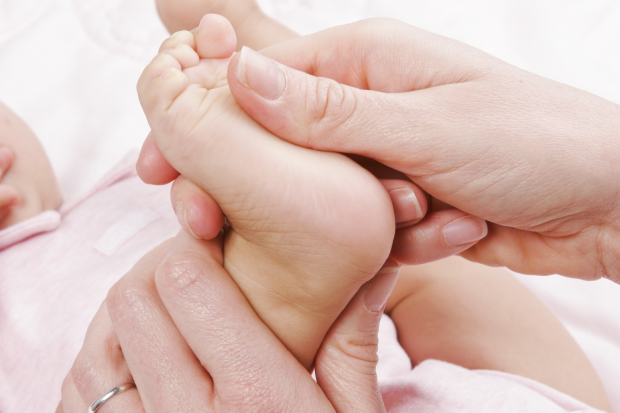Tender Touch The Soothing Benefits of Infant Foot Massage
Your gentle touch and stroke has the power to instantly alleviate your baby’s crying, crankiness, gas, tummy pains and general discomfort.
Nothing can relax and soothe the body more than a gentle massage, and this is also true for infants. In fact, babies especially can benefit from therapeutic touch, which research suggests helps them thrive as well as relieves common discomforts like tummy troubles, fussiness, colic, teething pains and sickness. What’s more, a loving infant foot massage helps you, your partner and your baby bond in ways you never thought imaginable.
Why Infant Foot Massage Is Helpful
You can massage pretty much every part of your baby’s body to help relax him or her, induce sleepiness and ease discomforts. But massaging your infant’s feet is particularly helpful for a variety of conditions. Reflexology experts believe that the feet are connected to the rest of the body and that gentle massage on certain points has the ability to affect other body parts. For instance, massaging your baby’s toes can ease his or her head and teeth pains, massaging the sole of the foot just under the pad can soothe your baby’s upper abdominal area, massaging the sole of the foot just above your infant's heel can soothe the lower abdominal area, and massaging the heel on a baby's foot can relieve pelvic discomfort.
Basic Infant Massage Tips
There are a few things parents should keep in mind before engaging in massage activity with their baby. They include:
- Using the Right Amount of Pressure: It’s true that babies are tough, but you’ll want to be extra careful while administering an infant massage. Your touch should be firm enough that your baby benefits from your therapeutic rubbing, but gentle enough so as not to irritate his or her tiny body.
RELATED ARTICLES:
- Following Your Baby’s Cues: While most infants enjoy massages, sometimes they’re just not on the mood. If your baby seems agitated, pulls away at your touch or squirms away from you, try massaging him or her at a different time. Similarly, if your baby allows you to massage part of his or her body (his feet and legs, for example) but then grows tired before you move on to other parts of the body, it’s completely okay to stop and resume at another time. Never force massage time on your baby.
- Keep It Comfy: Infant massage is most beneficial when both you and your baby are warm and comfortable. Keep the temperature in the 75 degree range so your infant doesn’t get too cold or too hot, and choose a place that’s soft for your baby and easy for you to reach. Examples include his or her changing table, your bed or a blanket on the floor. You can add edible, organic oils such as coconut oil, olive oil, avocado oil or grape seed oil to your massage routine, as well as soft music.
*Editor’s Note: If you choose to use oil during your infant’s massage, it’s best to avoid nut oils, as they may irritate allergies.
Explore Massage Techniques
There are a number of different massage techniques you can use on your baby. You can go by instinct to gently massage his or her feet, legs, tummy, arms, hands, head and face. Or you can buy a book to help you navigate your way through infant massage. One option is Infant Massage: A Handbook for Loving Parents by Vimala McClure, available on Amazon. The important thing is to not overthink it. There is no right or wrong way to massage your baby, as long as you’re gentle. Just enjoy the moment, and both you and your baby will be able to relax and bond.
As you explore the world of infant massage, you’ll soon realize that not only does it have a lot of benefits for your baby, the gentle massaging has a lot of benefits for you, as well. Infant massage therapy improves both you and your baby’s moods, is a nurturing way to spend time together, and is parent-child bonding at its best.
Notice concerning medical entries:
Articles having medical content shall serve exclusively for the purpose of general information. Such articles are not suitable for any (self-) diagnosis and treatment of individual illnesses and medical indications. In particular, they cannot substitute for the examination, advice, or treatment by a licensed physician or pharmacist. No replies to any individual questions shall be effected through the articles.






